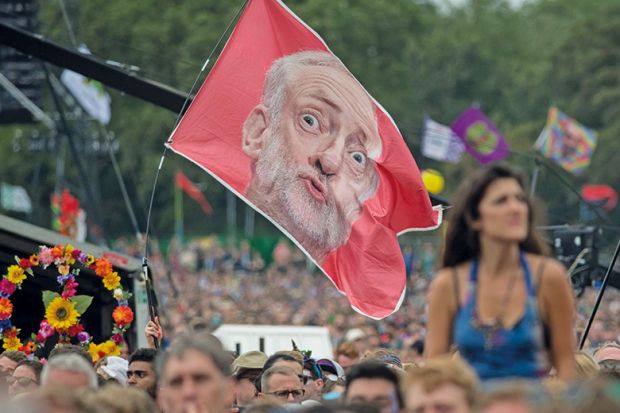“Being a Labour supporter at the moment feels a bit like when your favourite band releases an experimental album,” observed the comedian Bill Bailey at last week’s Times Higher Education Leadership and Management Awards.
The quip was particularly timely as Jeremy Corbyn, the Labour leader, was about to appear on the Pyramid Stage at the Glastonbury festival. Corbyn the political rock star is some turnaround for a man who was supposedly drumming his party to electoral oblivion just a few months ago.
But then, the whole of the past year has felt a bit like an experimental album.
Last week marked the first anniversary of the Brexit vote, and many in UK higher education still haven’t come to terms with the shock of the result.
The increasingly chaotic nature of Brexit, the damage it is already doing to the economy, and the extent to which it is going to dominate British political priorities for years to come arguably make it an even graver concern in academic circles today than it was a year ago.
And the atmosphere of experimentalism isn’t limited to Brexit and the Labour Party.
When, a few months after the referendum, the US did its best to upstage the UK by electing Donald Trump as president, it was seen as evidence of a multinational swing to the right that had caught liberals unaware. Many feared an unstoppable domino effect.
Democracy is messier than that, however. The focus turned to the Netherlands and France in the spring, with the apparently resurgent far Right fielding Geert Wilders and Marine Le Pen.
In the event, though, both lost, with the French election instead delivering liberalism a shock from a defibrillator in the form of Emmanuel Macron, Europe’s new sun king.
Then it was the UK’s turn again, with the general election called by Theresa May in the expectation that she would win a landslide victory and a mandate for her vision of hard Brexit.
The rest, as they say, is history.
It’s an awful lot of political drama to have encountered – endured may be a better word – in a single year. And for universities, the result has been a period of unprecedented instability.
But such moments can have positive aspects. Britain is hoping for a more conciliatory, collaborative European relationship post-Brexit than would have been the case had Theresa May not been reined in by the electorate. And May’s hard line on the reduction of net migration to the tens of thousands (a target with grave implications for international students) appears to be less certain than it was, receiving no mention in last week’s Queen’s Speech.
The question is what can now be done by universities to actively shape the future direction of government and Britain’s place in Europe and the world.
Writing in THE recently, Sir David Bell, vice-chancellor of Reading University and a former mandarin at the Department for Education, advised higher education to pull itself together. To deal pragmatically with the world as it is. To stop complaining in order to start influencing.
In our news pages this week, we report on a practical suggestion from Graeme Reid, professor of science and research policy at University College London and a former head of research funding in government, who also warned the sector against special pleading.
“The sorts of things that trouble universities are closely aligned with the sorts of things that trouble investment banks, global law firms and global accounting firms,” he told a THE event last week.
“Instead of trying to make a special case for universities, I think that the university community needs to find alliances with other parts of the community so that we have a coherent ask.”
What Bell and Reid have in common is that both have worked in government at the highest levels; both know what works and both have the interests of the wider higher education sector at heart.
It would be wise, then, for the advice they dispense to be taken seriously, rather than defaulting to what has undoubtedly come to be seen in government as excessive special interest lobbying.
At stake is the vital role that universities must play in defining not only their own future but the future of the entire country post-Brexit. And they won’t be able to exert any influence if they’re exiled to the Dark Side of the Moon.
Register to continue
Why register?
- Registration is free and only takes a moment
- Once registered, you can read 3 articles a month
- Sign up for our newsletter
Subscribe
Or subscribe for unlimited access to:
- Unlimited access to news, views, insights & reviews
- Digital editions
- Digital access to THE’s university and college rankings analysis
Already registered or a current subscriber? Login
